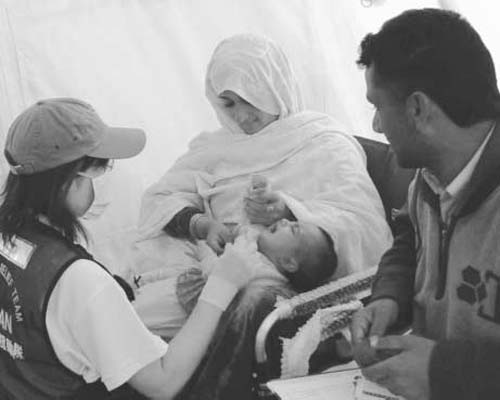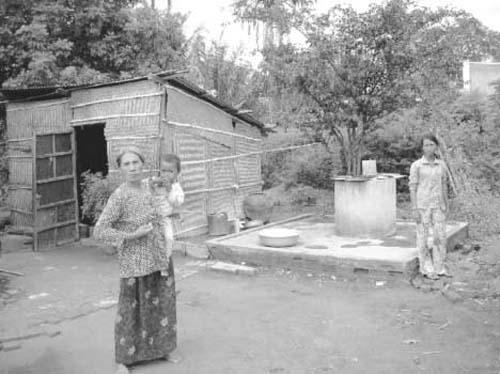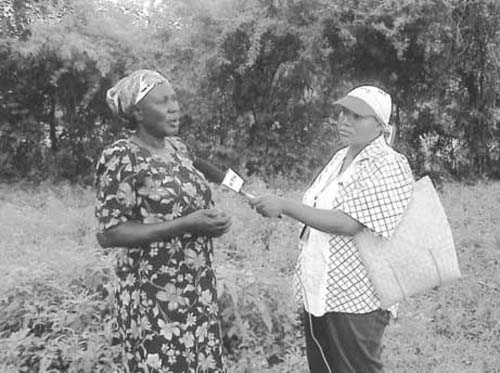Japan's Official Development Assistance White Paper 2006
Box II-1. Women in Development: Examples of Japan's Assistance
Dispatch of Japan Disaster Relief Teams for Major Earthquakes Such as in Pakistan
Japan dispatched Japan Disaster Relief Teams when Pakistan was struck by a major earthquake of a magnitude of 7.6 in October 2005 which caused serious damage. As Pakistan is an Islamic country, many women feel psychological inhibitions regarding being examined by male doctors or interacting with male staff.
To enable female victims to receive emergency medical services without resistance in this context, the teams were formed with a male-female ratio of 3:2, and efforts were made to respond to the victims by staff of the same sex as much as possible. Also, to facilitate the receiving of examinations by female patients, clinics provided separate male and female reception and waiting rooms.
Through this effort, many women were able to receive examinations, with a male and female examination ratio of 54% and 46%, respectively.

Examination of a female victim by a female doctor (Photo: JICA)
Commitment of Yen Loan Projects
Japan gives consideration to gender equality in implementing its ODA projects, as clearly stated in the basic policies in Japan's ODA Charter.
Specifically, arrangements are being strengthened for women to participate together with men in discussions involving residents related to project planning and implementation. For example, for Viet Nam's Phan Ri - Phan Thiet Irrigation Project, not only men but also women were given the chance to express their opinions during a meeting held to explain the project. During the meeting, opinions were given from female viewpoints on issues related to both men and women (e.g., compensation accompanying site acquisition), and on issues related to women such as ensuring water for domestic use and the treatment of household waste water. Based on this discussion, the installation of a well and wastewater tank was included in the project plan.

Residents of a planned project site (Photo: JBIC)
Gender and Millennium Development Goals (MDGs) Project (UNDP / Japan WID Fund)
Gender equality is indispensable for achieving the Millennium Development Goals (MDGs). Japan is supporting projects aimed at reflecting the opinions of both men and women in the policy for achieving MDGs. Specifically, support is provided through the Japan WID Fund established in the UNDP targeting five countries (Kenya, Morocco, Cambodia, Kyrgyzstan, and Peru).
For example, in Kenya Japan supported the inauguration of the Millennium Initiative by African women. This created the opportunity for 50 women in Kenya and other participants from 10 African countries to voice their own concerns and thoughts to the Kenyan government and to United Nations officials. Also, as a result of activities to reflect the voices of women living in poor regions into policies for poverty reduction at the local government level, a regional-level gender equality program was formulated.
The budget and policy were formulated reflecting women's expectations and opinions as a result of these activities focused on women. For instance, the value added tax on daily necessities such as corn meal and cooking oil was eliminated from the 2005/2006 budget for the Government of Kenya.

Rural woman interviewed on MDGs and poverty (Kenya) (Photo: UNDP)


 Next Page
Next Page